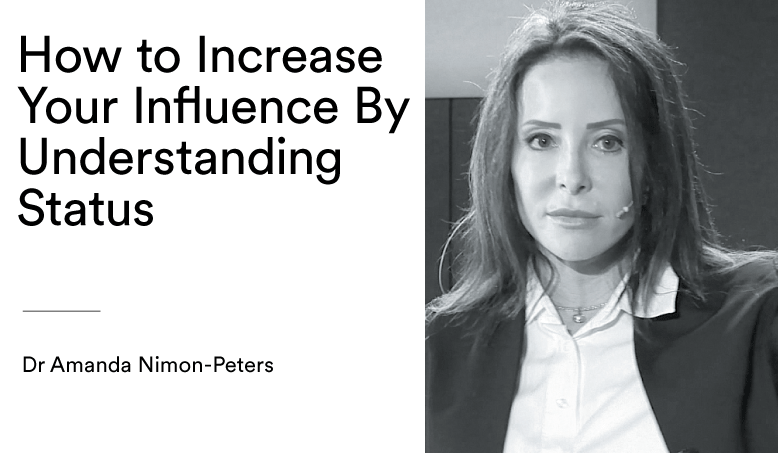The ability to influence people and decisions in the workplace is a highly desirable skill sought by professionals throughout their careers. There is likely to be a moment when you need to influence someone you don’t have authority over. For example, you may need to persuade senior leaders to adopt your proposal in a board meeting or convince an interviewer that you are the best person for the job.
You may think that some people are just born influential, but it is also a complex skill that can be learned. Every species exhibits broad-level behavioral trends, and humans are no exception. Despite the fact that everyone in your workplace is unique, there are also many patterns and thought processes that are common to most individuals, most of the time. With a little science-based insight, you can more effectively upskill yourself and your workforce when it comes to influence.
Humans everywhere are more heavily persuaded by people perceived to be high status.
Higher status for influence
The complex skill of influence is made up of smaller individual skills that can each be practiced and mastered separately. One of these is status.
Humans everywhere are more heavily persuaded by people perceived to be high status. Unfortunately, not being stand-out attractive, physically imposing, or loudly spoken can lead to the perception that you are less authoritative – or ‘lower status’ – than others who are quieter, smaller in stature, or more ‘attractive’ as society would perceive it.
A taller or older man is not necessarily the one putting himself in charge: everyone is putting him in charge.
The fact this happens does not mean that everyone in that workplace intentionally believes your contributions to be less valuable. As a social species (just as in the animal world) we continually evaluate other human beings at both a conscious and subconscious level. This means we naturally attribute greater status to individuals who are male rather than female, taller rather than below-average height, and more attractive rather than below average in attractiveness.
Age can also affect status. Research shows that when complete strangers aged 18 to 65 on jury service need to determine a leader for the group discussion, they are four times more likely to appoint someone aged over 45 than someone aged 18 to 44. Not only is it possible that this entire process has occurred unconsciously, but it is also supported by group consensus. A taller or older man is not necessarily the one putting himself in charge: everyone is putting him in charge.
Consider whether or not you might be subject to negative stereotypes about your ability. Prepare in advance to counteract those stereotypes.
When we operate as a team, department, or committee, that evaluation results in a ranking of team members according to their perceived status, and in turn, this determines the extent to which we are influenced by them.
If you find yourself in one of these potentially ‘low status’ categories it is certainly possible for you to create a status for yourself irrespective of your physical characteristics:
If you are less inclined to make your voice heard, it is important to recognize that your personality type in no way renders your ideas less worthwhile.
- Recognize negative stereotypes in order to diminish them. The status ranking effects of our physical features are largely based on cultural stereotypes – and sadly they affect our unconscious judgments. Consider whether or not you might be subject to negative stereotypes about your ability. Prepare in advance to counteract those stereotypes. How could you label yourself in a manner that classifies you as a strong performer instead?
- Prepare authoritative, data-based statements. So long as the argument involves one opinion against another, the person with the higher status will win by group consensus. However, if the lower-ranked person has the relevant statistics and data to support their point, they will increase the authority of their argument.
- Demonstrate contextual status factors. You may not walk into a meeting with a physical appearance that communicates high status, but you can increase your perceived status if you can demonstrate contextual status factors such as overall level of education, prior experience in a specific job role or industry, or quantified expertise in the topic of discussion.
Rather than thinking of dressing to look stylish or formal, think of dressing in line with the status and authority you want to establish.
- Speak up with confidence. Sadly, but truthfully, humans tend to confuse confidence with capability. If you are less inclined to make your voice heard, it is important to recognize that your personality type in no way renders your ideas less worthwhile. However, to generate status and influence for yourself in a professional group, planning to participate early and confidently will help enormously.
- Dress for status. Rather than thinking of dressing to look stylish or formal, think of dressing in line with the status and authority you want to establish. That means you need to reflect on the strengths you wish to portray and ask, ‘How would that person dress?’ While research on status characteristics tells us that attractive people often achieve higher status, be careful as it also shows that more revealing clothing can lead both men and women to rate female candidates as less competent.
Ultimately, the more opportunity people have to experience leaders and successful role models representing a wide and dissimilar range of characteristics, the less physical factors will wield power in workplace discussions and decisions.
Further, if you are in a position of authority or leadership in a company, having the humility and self-awareness to work on changing these patterns can result in a wider variety of valuable and potentially innovative ideas for your company.


